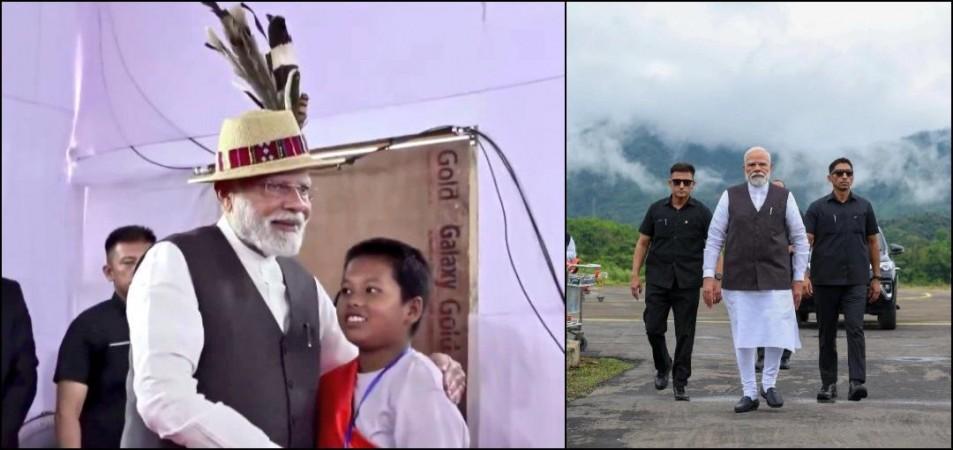
Prime Minister Narendra Modi embarked on a pivotal two-day visit to the northeastern states, focusing on Manipur, a region that has been grappling with ethnic violence since May 2023. This visit marked his first to Manipur since the unrest began, significantly impacting the Kuki and Meitei communities. During his visit, the Prime Minister laid the foundation stones for several development projects and engaged with communities affected by the violence.
Upon arriving in Churachandpur, a district predominantly inhabited by the Kuki community, Prime Minister Modi initiated development projects valued at over Rs 7,300 crore. These projects aim to enhance infrastructure and connectivity in the state, addressing long-standing challenges due to its geographical location. Key initiatives include the Manipur Urban Roads, Drainage and Asset Management Improvement Project, and five National Highway projects, among others.
With warmth, care and gratitude, PM Modi meets families staying in relief camps at Churachandpur, Manipur. pic.twitter.com/nmsHESk4UU
— BJP (@BJP4India) September 13, 2025
Addressing a large gathering in Churachandpur, Prime Minister Modi expressed his admiration for the resilience and determination of the people of Manipur. He stated, "Manipur is the land of courage and determination. These hills are a priceless gift of nature, and at the same time, they symbolize your continuous hard work. I salute the passion of the people of Manipur." Despite heavy rainfall, which prevented his helicopter from flying, the Prime Minister chose to travel by road, allowing him to witness firsthand the enthusiasm of the people who greeted him with the Indian Tricolour.
#WATCH | Manipur: PM Modi being welcomed in Churachandpur as he arrives in the city. PM also interacts with the locals of the city.
— ANI (@ANI) September 13, 2025
PM will lay the foundation stone of multiple development projects worth over Rs 7,300 crore at Churachandpur today. The projects include Manipur… pic.twitter.com/wvDxi3P28i
Infrastructure and Connectivity Boost
The Prime Minister emphasized the government's commitment to advancing Manipur on the path of development. He highlighted the region's rich traditions and culture, noting that the vibrancy and diversity of Manipur reflect India's strength. "The name Manipur itself contains 'Mani', which symbolizes a jewel that will enhance the sheen of the entire Northeast in the times to come," he remarked.
Connectivity has been a longstanding challenge for Manipur, given its status as a border state. Prime Minister Modi acknowledged the difficulties faced by the people due to inadequate road infrastructure and reiterated his government's focus on improving connectivity since 2014. In recent years, Rs 3,700 crore has been invested in National Highways in Manipur, with ongoing projects worth Rs 8,700 crore. The Prime Minister also announced plans to extend railway connectivity in the state at a cost of Rs 22,000 crore, with the Jiribam-Imphal railway project set to link the state capital with the national railway network.
#WATCH | Churachandpur, Manipur: Prime Minister Narendra Modi lays the foundation stone of multiple development projects worth over Rs 7,300 crore at Churachandpur. The projects include Manipur Urban Roads, drainage and asset management improvement project worth over Rs 3,600… pic.twitter.com/SqNNAAvr0I
— ANI (@ANI) September 13, 2025
In addition to infrastructure development, the Prime Minister assured the people of Manipur of the Centre's continued support for peace and prosperity. He acknowledged the impact of the violence on the state and informed the gathering that talks have been initiated with various ethnic groups to address the issues and restore peace. "I appeal to all concerned to help the government to restore peace and to ensure the development for the betterment of all, especially the future of the new generations," he urged.
Commitment to Peace and Tribal Development
Before addressing the public at the Peace Ground, Prime Minister Modi visited relief camps housing thousands of displaced individuals affected by the violence. He interacted with the inmates, offering them words of encouragement and support. The Prime Minister highlighted the government's efforts to provide aid to those rendered homeless, including the construction of over 7,000 houses and a special package of Rs 3,000 crore for the state.
The Prime Minister also underscored the importance of tribal development, particularly in Churachandpur, a district with a significant tribal population. He noted that special development initiatives have been undertaken in over 500 tribal-inhabited villages in Manipur. The construction of 18 Eklavya Model Residential Schools is part of the government's efforts to empower the tribal communities and improve educational opportunities.
Healthcare and education have been prioritized in the development agenda, with the establishment of a medical college in Churachandpur and the strengthening of 120 high schools and higher secondary schools across the state. The Prime Minister highlighted the progress made in providing essential services, such as electricity and piped water connections, to thousands of households in Manipur.

The visit also included the inauguration of infrastructure projects worth Rs 1,200 crore from the historic Kangla Fort in Imphal. The Prime Minister's decision to travel by road, despite adverse weather conditions, was seen as a gesture of solidarity with the people of Manipur. An official noted, "Despite heavy rain, PM Modi decided that he would reach the rally venue by road, no matter how much time it took, just so that he could interact with the people."
Historical Context and Future Prospects
The Prime Minister's visit to Manipur was part of a broader effort to address the challenges faced by the northeastern states and to promote development and peace in the region. His engagements in Mizoram and Assam included the launch of projects aimed at improving connectivity and infrastructure, such as the Bairabi-Sairang railway line in Mizoram and the Narengi-Kuruwa bridge in Assam.

Historically, the northeastern region of India has faced numerous challenges related to ethnic tensions, underdevelopment, and connectivity issues. The government's focus on infrastructure development and peacebuilding in Manipur is reminiscent of past efforts to address similar challenges in other parts of the country. The emphasis on dialogue and negotiation with ethnic groups reflects a commitment to finding lasting solutions to complex issues.

















